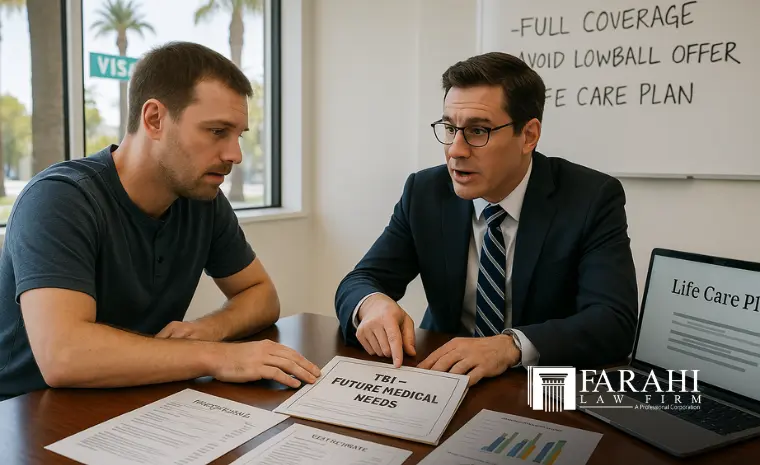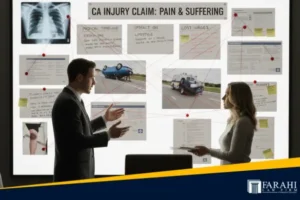Summary
Understanding and documenting future medical needs after TBI is crucial for securing fair compensation. Your claim should include every expense, from rehabilitation and medical procedures to long-term care. Early legal help ensures your rights are protected and your recovery journey is fully supported.
Table of Contents
Future medical needs after TBI can last a lifetime, with expenses that go far beyond the first hospital visit. A traumatic brain injury (TBI) from a car crash, fall, or other serious incident can change every aspect of your life, from your ability to work to how you connect with your family members.

In California, victims often face months—or even years—of medical care, therapy, and adjustments to daily living. Knowing exactly what to include in your claim helps ensure your recovery is supported now and in the future. The sooner you act, the better your chances of securing full and fair compensation.
Why Future Medical Needs After TBI Are So Important
A brain injury is rarely just a short-term event. Damage to the head and brain can lead to cognitive impairment, difficulty with coordination and balance, and even severe disorders of consciousness such as a vegetative state or minimally conscious state. Even a mild TBI can leave you dealing with post-concussive syndrome, headaches, dizziness, and memory problems for months or years.
According to the Centers for Disease Control and Prevention (CDC), TBIs are a leading cause of disability in the United States, with many survivors requiring ongoing rehabilitative treatment and specialized medical attention for the rest of their lives. These costs can easily exceed hundreds of thousands of dollars—sometimes even millions—over a lifetime. Without careful planning, you could be left responsible for expenses that should be covered in your settlement.
Common Future Medical Costs to Include in a Claim
When building your claim, it’s crucial to account for all potential future medical needs after TBI, including those that may arise years from now. Common categories include:
Category | Examples |
Rehabilitation services | Physical therapy, occupational therapy, speech therapy, vocational rehabilitation, and brain injury rehabilitation programs designed to restore independence |
Specialist care | Ongoing visits with neurologists, primary care providers, neuropsychologists, and physical medicine specialists |
Medical procedures & devices | Surgeries, assistive technology for sensory perception, mobility aids, and adaptive equipment |
Home modifications & care | In-home nursing, post-acute care, ramps, grab bars, and wheelchair-accessible changes |
Medication & monitoring | Long-term prescriptions, CT scan follow-ups, and regular assessments to track recovery |
Spinal cord-related care | Treatment for concurrent spinal cord injuries and mobility restoration |
Including every possible category—and supporting each with evidence—helps prevent insurance companies from dismissing or undervaluing parts of your claim.
The Role of Care Plans in TBI Claims
A care plan is one of the most powerful tools in a TBI case. This detailed document, created by a qualified healthcare provider, projects your lifetime medical costs and needs. It may include:
- All therapies, including physical therapy, occupational therapy, and speech therapy
- Necessary medical procedures and surgeries
- Specialized devices for coordination and balance support
- Long-term rehabilitation services and post-acute care
- Psychological support and support groups for ongoing recovery
A well-prepared life care plan ensures your future medical needs after TBI are clear and backed by expert evidence, making it harder for insurers to deny or minimize your claim.
How to Avoid Lowball Settlements from Insurers
Insurance companies often aim to settle quickly—especially in complex head injury or spinal cord cases—to reduce their financial exposure. These “lowball” offers may seem tempting when bills pile up, but they often fail to account for lifelong rehabilitative treatment or specialized rehabilitation services.
You can protect yourself by:
- Working with a top-rated brain injury lawyer in Visalia who understands the complexities of TBI cases
- Using expert testimony from doctors, therapists, and physical medicine specialists
- Submitting a comprehensive life care plan
- Providing documentation of all medical care, medical procedures, and equipment costs
- Demonstrating how your injury affects daily life and independence
The stronger your documentation, the less room for insurers to dispute your claim.
Actionable Steps for Victims & Families
If you or a loved one suffered a traumatic brain injury in California, here’s what you should do:
- Seek immediate medical attention after the injury—whether from a car crash, fall, or other accident.
- Request diagnostic imaging such as a CT scan to assess internal damage.
- Follow up with your primary care provider and any necessary specialists.
- Begin documenting all treatments, including rehabilitative treatment, rehabilitation services, and participation in support groups.
- Maintain a record of medical procedures, adaptive devices, and home modifications expenses.
- Access social support resources and consider joining survivor-focused support groups.
- Continue to wear a seat belt in vehicles to prevent further injury.
- Consult a local personal injury lawyer near you.
The Human Side of Recovery
Recovering from a TBI is about more than just physical healing—it’s about regaining quality of life. This can mean addressing sensory perception changes, relearning skills through vocational rehabilitation, or working with therapists to improve speech and movement.
Survivors in Visalia, especially those living near Main Street and the surrounding Downtown Visalia area, may benefit from post-acute care programs where intensive therapy supports the transition from hospital to home.
Involving your family members in the process can provide essential emotional strength. They can help track your symptoms, attend medical appointments, and connect you with social support networks in the Visalia community that make recovery less isolating.
FAQs on Future Medical Needs After TBI
You should collect evidence to build a strong claim:
- All hospital and medical care records
- Imaging results (CT scan, MRI)
- Notes from your primary care provider and other healthcare providers
- A detailed life care plan from a qualified expert
- Receipts for devices, therapy, and medical procedures
- Documentation of rehabilitation services, brain injury rehabilitation, and support groups attended
Recovery timelines vary, but survivors often benefit from:
- Physical therapy, occupational therapy, and speech therapy for mobility, coordination, and communication
- Vocational rehabilitation for returning to work or finding new opportunities
- Access to support groups and social support networks
- Continued care from physical medicine and neurological specialists
- Adaptive devices to assist with coordination and balance
Yes. In most personal injury cases, including those for future medical needs after TBI, you have two years from the date of the injury to file a lawsuit. Claims involving government agencies may have much shorter deadlines. Delaying can result in losing your right to compensation—another reason to contact our attorney immediately.
Start Your Way to Full Recovery: Get the Medical Care You Deserve Today
Living with a brain injury, whether it’s a mild TBI or a severe spinal cord and head injury, is challenging enough without worrying about future medical costs. From rehabilitative treatment to medical procedures and ongoing therapy, your claim should cover every need—now and decades into the future.
At Farahi Law Firm, we’re committed to ensuring your future medical needs after TBI are fully accounted for, so you and your family members can focus on recovery.
📞 Contact us today for a free consultation and let us fight for the medical attention and financial security you deserve.



